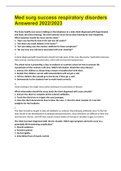Exam (elaborations)
Med surg success respiratory disorders Answered 2022/2023
- Course
- Institution
Med surg success respiratory disorders Answered 2022/2023 The home health-care nurse is talking on the telephone to a male client diagnosed with hypertension and hears the client sneezing. The client tells the nurse he has been blowing his nose frequently. Which question should the nurse ask the...
[Show more]



